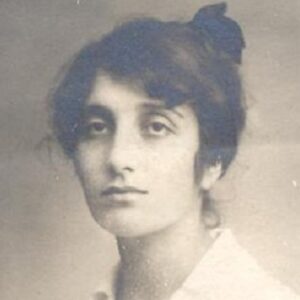Dora Gabe was a celebrated Bulgarian poetess who wrote and translated for the majority of the twentieth century. She was born to a journalist father who instilled in her a strong work ethic. She attended university to study Natural Sciences and spent several years traveling abroad, where she acquired a variety of languages. She was commissioned to translate numerous works by renowned authors and government officials from an early age. She carried these works with her on a grand tour of Europe, lecturing on Bulgarian literature and the period’s political turmoil. She also wrote numerous original works; her primary focus was poetry; she published works such as ‘Spring’ and ‘Don’t Come Near Me!’ that were well received at the time. They have withstood the test of time, being read and studied in Bulgarian schools to this day. She also wrote extensively for children, publishing books and editing a couple of school magazines. She collaborated with other European authors to found the Bulgarian PEN Club, whose mission was to foster creative communication during the difficult years of the two world wars. She is still remembered for this, as well as for serving as the organization’s chairman. She also worked for the Bulgarian Embassy in Poland as their cultural affairs counselor, a significant position for a woman at the time.
Childhood & Adolescence
Pavel Gabe was her father. He was a Polish Jew who had the distinction of being the first Jewish man elected to Bulgaria’s Parliament, the Bulgarian Narodno Subraine.
Due to the fact that her father was not permitted to serve in Parliament despite his election, he took up journalism seriously and became a prominent figure in the country. He encouraged her to pursue a career in academia.
In 1904, she earned a degree in Natural Sciences from ‘Sofia University.’ A year later, she embarked on a two-year journey to study French Philosophy in Switzerland and France.
Career of Dora
In 1907, she returned to her native country and began teaching French in the Bulgarian town of Dobrich.
She published her first poems, ‘Spring’ and ‘Violet’, in 1908. Even today, ‘Spring’ is a frequent topic of discussion in Bulgarian classrooms.
She traveled to the United Kingdom, France, Austria, the Czech Republic, Poland, Germany, and once again to Switzerland beginning in 1912 and continuing until the end of her life.
She began her career as a great translator during this trip, handling the works of Konopnicka, Wyspianski, Mickiewicz, and others. This work continued for the remainder of her years.
In the 1920s and 1930s, she lectured on Bulgarian literature and the fate of Dobruja, a piece of land that had been divided for hundreds of years between Romanian and Bulgarian ownership. Gabe’s time period saw the formation of the ‘Internal Dobrujan Revolutionary Organization’ with the objective of retaining the land for Bulgaria. Gabe advocated for this organization.
She completed her translation of a multi-volume anthology of Polish poets in 1921. Four years later, she was appointed editor of the Bulgarian Ministry of Education’s ‘Biblioteka za nai-malkite’ (‘library for the youngest’). In 1927, she co-founded the Bulgarian PEN Club, a federation of writers dedicated to the advancement of creative communication. For many years, she served as chairman.
Gabe was at the pinnacle of his writing during this time period. She wrote poetry for children and adults, theater and literature reviews, political essays, and short stories, among other things. Between 1920 and 1935, the majority of the works were written. ‘Wait sun’, ‘The world is a secret’, and ‘Invisible eyes’ are among his most famous works. She served as editor of the children’s magazine ‘Window’ in 1939. For five years, she served in this capacity.
In 1944, she moved to another children’s magazine, ‘Nightingale.’ She contributed a number of articles to this journal.
She worked at the Bulgarian Embassy in Poland for three years beginning in 1947 as counselor for cultural affairs.
Works of Significant Value
She wrote numerous famous poems, including ‘Spring’ and ‘Don’t Come Near Me!’ that are still taught in Bulgarian schools and read worldwide.
She translated numerous famous works of other poets and authors beginning in 1917 and continuing throughout the remainder of her long life.
In 1927, she founded the ‘Bulgarian PEN Club,’ a group that aided the careers of numerous other European writers at the time.
Distinctions & Honors
In 1968, she was inducted into the Bulgarian city of Tolbuhin as a ‘Honorary Citizen.’
Personal History and Endowment
Although the dates are largely obscure, she was married to Professor Boyan Penev. Their wedding occurred prior to her extensive European travel, implying that it occurred during or shortly after her time at university.
Her written works are still taught in Bulgarian schools, where she is accorded the same reverence as Keats and Poe are in the United Kingdom and the United States.
The Dobrich City Council instituted the first ‘National Literary Prize: Dora Gabe’ in 2003 to recognize literary excellence. It is presented every five years to someone who has contributed significantly to the creation of significant works of literature, such as Gabe.
Estimated Net Worth
Dora is one of the wealthiest poets and is ranked among the most popular poets. Dora Gabe’s net worth is estimated to be between $1-5 million, based on our analysis of Wikipedia, Forbes, and Business Insider.
Trivia
During her marriage, this famous poetess allowed her poet husband to exercise control over her passions and interests. She continues, stating that – while regrettable – she was only able to live her own life following his death.
Although this celebrated poetess began as a translator, her works are now available in more than a dozen languages.


